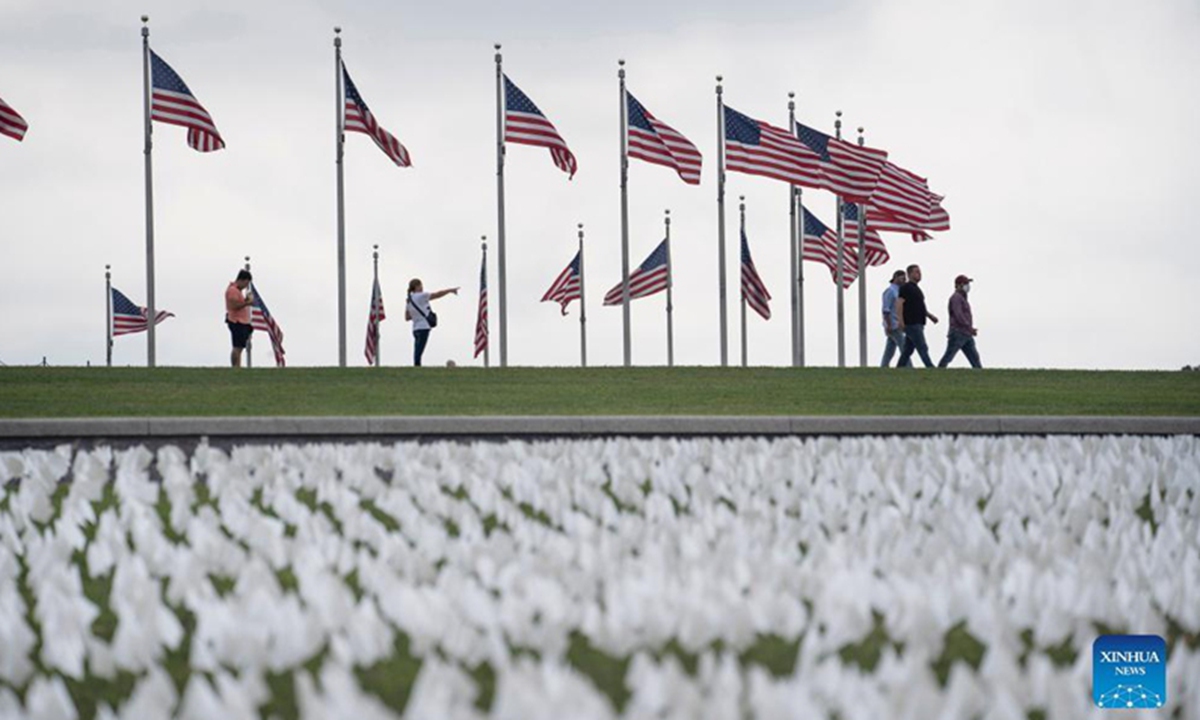
White flags are seen on the National Mall in Washington, D.C., the United States, on September 16, 2021. More than 660,000 white flags were installed here to honor the lives lost to COVID-19 in the United States.Photo:Xinhua
"China's 'Zero-Covid' Policy Holds Lessons for Other Nations," reads the headline of an article in The Wall Street Journal Wednesday. This surprised many people, who questioned whether this was the same media that had constantly attacked China on its COVID-19 prevention and control strategy.
Such "abnormality" can also be seen in a recent Bloomberg article, entitled "Why the World Needs China's Covid-Zero Policy," which affirms the role China's dynamic zero-COVID policy has been playing in safeguarding global supply chains.
It seems like some US media outlets, willingly or not, have finally woken up to reality. According to Li Haidong, a professor at the Institute of International Relations of the China Foreign Affairs University, this is because it is clear the impact of different epidemic responses in China and the US on each nation's economic and social development. Facts and results of Beijing's epidemic prevention and control policy are just too hard to deny now.
One of the examples would be how China managed to control the Omicron variant of the novel coronavirus amid the Beijing 2022 Winter Olympic Games. Before the event began, some Western media and elites kept hyping the theory that China's zero-COVID strategy "won't work" against the highly transmissible variant. But now that the Games are coming to an end, the situation, both inside and outside the "closed loop" management system, has slapped these people in the face.
Yet, the existence of those relatively calm voices in US media does not mean that Washington is trying to learn from Beijing's experience in COVID-19 prevention and control. This is more a way for US elites to reflect on their country's mistakes through the contrasting realities between China and the US caused by different COVID-19 strategies.
Of course, even if some in Washington want to learn from Beijing, the former cannot fully learn from the latter's experience. Li told the Global Times that this is partly due to cultural and institutional differences. For example, in contrast to individualism and decentralization in the US, China's strong top-down devotion to take action and ability to cooperate shown in the epidemic prevention and control process is something hard for others to learn.
On the other hand, the learning process will be hindered by the US' foul political environment, including polarization of domestic politics, dysfunction of the political system, and rising anti-China sentiment. Li noted that many opportunistic careerists are taking advantage of the loopholes in the US system. "US politicians now show the importance of themselves or their party through attacking their political rivals. They think more about how to use the chaos at home to increase their own power," he said.
Against such a backdrop, the public's distrust of the government has also grown. As a result, people in the US are more likely to disagree with any policy the government has developed. This has, in fact, pushed Washington into a dead end in the fight against the epidemic.
With all these barriers, the West, particularly the US, is facing a painful dilemma: To learn from China - too difficult; not to learn from China - more tragedies. Moreover, for some Western elites, learning from the Chinese experience means confirming that China has beaten the West in terms of COVID-19 strategy. This is something they do not want to admit. This is why self-reflection from US media came so late.
The novel coronavirus has killed more than 920,000 people in the US, and the number is still rising. People always say, "Better late than never." But now the question is, how much time is left for US elites to continue to reflect and make changes before the country reaches the disgraceful milestone of one million deaths?
The White House COVID-19 Response Team announced Wednesday that the US is moving toward "a time when COVID isn't a crisis." However, is the crisis really over soon? It is afraid that the crisis in US politics and society exposed during the epidemic will still linger on.




